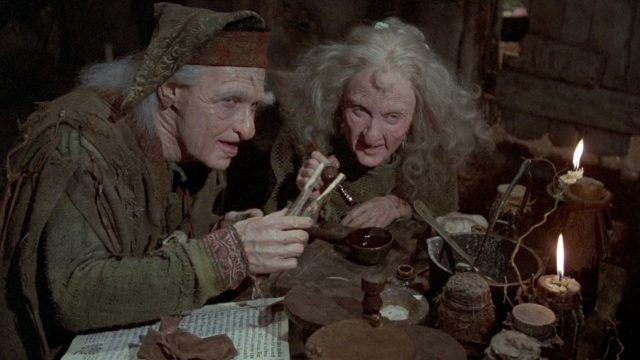Pass the Plate for Your Heaping of :
- anachronistic accents
- bad bloggers
- screen sex
- indie icons
- Carol Kane!
An extra portion of thanks to scb0212 and Miller for contributing this week. Send articles throughout the next week to ploughmanplods [at] gmail, post articles from the past week below for discussion, and Have a Happy Friday!
For Metrograph, Nathan Silver interviews Carol Kane about Taxi, Joan Micklin Silver and getting an early start as a perfectionist:
I started at a children’s theater in Ohio. There was an incredible guy there named Jerry Leonard who was so demanding with us little kids—most of us started at five or six years old. I did The Wizard of Oz, and, you know, the Munchkins have that thing: “Don’t go to the east!”—we were idiots on stage, pointing in whatever direction, and Jerry came storming down the aisle: “No! The east is this way!” He was a perfectionist. At that young age, I learned you have to get it as good as you can get it. Now I’d say that, to some degree, I was an insane perfectionist when I was young, which I think was costly to me, and to some people around me.
Provoked by Denzel Washington’s New York accent in the new Gladiator 2 trailer, Hyperallergeic‘s Sarah E. Bond dives into the history behind British accents in the mouths of ancient Romans:
Many would blame Shakespeare for the ties between British accents and Romans. The bard wrote extensively about ancient Romans like Caesar, Antony, and Cleopatra. But as scholars have reconstructed, the English accent in the 16th and early 17th centuries was “a little more Edinburgh — and sometimes even more Appalachia — than you might expect.” The false expectations for today’s audiences likely stem not from early modern or contemporary Shakespeare productions, but from 20th-century films. […] In the 1960s and ‘70s, some films followed this pattern, while other films deviated. In Stanley Kubrick’s Spartacus (1960), the enslaved gladiators are Americans while the Roman masters are Britons. Movies like Star Wars: Episode IV – A New Hope (1977) largely maintained British accents (with the exception of James Earl Jones as Darth Vader) to signal the fascism of the Empire through their speech. But these decades also introduced loveable British Romans in the form of the BBC series I, Claudius (1976) and through many a Monty Python parody, including Life of Brian (1979). As Aldrete remarked, “the Romans [began] shifting to the sympathetic figures” in the 1980s. This mirrored the growing diplomatic closeness of the US and the United Kingdom, including their alliance in the Gulf War (1990–91) and Americans’ fascination with English monarchical figures like Princess Diana.
Rebecca Keegan profiles longtime awards blogger Sasha Stone who now courts a rightwing political audience after a social media backlash:
The white power “boo-boo,” as Stone called it on her Substack, Free Thinking Through the Fourth Turning, has shone a light on the political evolution of the Oscar blogger, who had long been a vocal Democrat, but has drifted rightward in recent years and cultivated a persona as a recovering Hollywood liberal. As her Awards Daily writers were posting business-as-usual stories on movie trailers and film festival lineups, Stone was penning columns on her Substack with headlines like, “The Red Pill Revolution,” “JD Vance is a Hero” and, in a recent post about me contacting her for this story, “How Did Orwell Know?” “I knew it was dangerous for me to head down this road and I hid it for a long time,” Stone says of her political shift. “Most of the people I used to count on as friends have stopped talking to me.” While Stone has provoked reactions from cringe to outrage for her comments on race, gender and sexuality, the white power remark may be the one to finally get her exiled from Hollywood. In some ways, the ostracism seems like what she’s wanted, living proof of her thesis on the left’s growing intolerance.
Rafal Zielinski, director of Screwballs and other 80s sex comedies, talks to Michael Bilandic at Screen Slate about Roger Corman’s rules for filmmaking:
I met [Corman] in Toronto and he felt like a professor. He wore a suit and tie, and was not what you’d expect. He was a very intellectual, very elegant, very refined man. He gave me three rules. He said, “Number one, you have to cast beautiful, interesting people, because it’s all about the actors. Rule number two, if you’re filming an actor and you put them in the corner of a room, you don’t point the camera into the corner with the corner behind the actor. No, no. You put the camera in the corner and you put the actor in front, so you get the whole room. That’s production value. Your whole job is to maximize production value.” And then, he gave me another rule. He said, “This is a teenage comedy. I need twelve shots of naked breasts.”
At The New York Times, Michael Rosenwald eulogizes Seth Bloom, a clown who brought laughter amid war:
Seth was like a jazz musician of physical comedy and clowning,” said David Kilpatrick, the director of education at the John F. Kennedy Center for the Performing Arts in Washington, which staged “Air Play” two years ago in one of its largest theaters. “He was clearly an extraordinary artist who leaned into a kind of connective, communal laughter that was really transformative.” Mr. Bloom’s career, and his relationship with Ms. Gelsone, began in one of the world’s most humorless and unromantic places: Afghanistan in 2003, during the aftermath of the United States’ overthrow of the Taliban. “Two clowns meet in Afghanistan — it sounds like a joke,” Mr. Bloom often said.
At The A.V. Club, Sean O’Neal talks about 2004 as the year “indie” music went high profile and sold out (wait, did we say Sean O’Neal? Speaking of throwbacks!):


